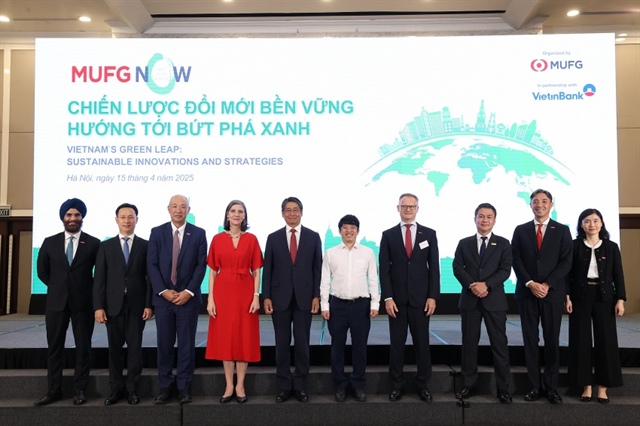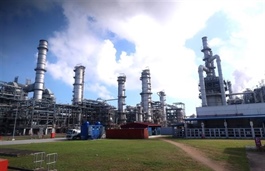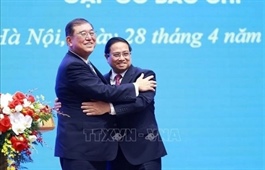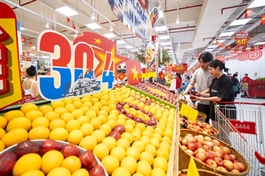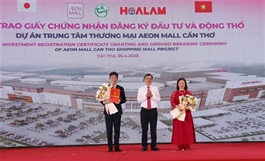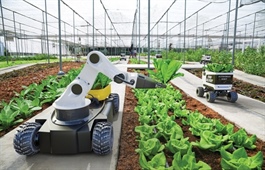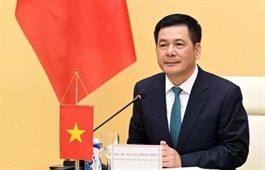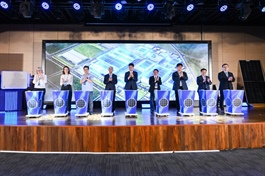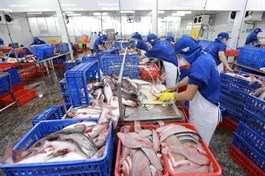MUFG N0W conference champions sustainable innovations and strategies for the country's net-zero future
MUFG N0W conference champions sustainable innovations and strategies for the country's net-zero future
Vietnam’s key industries, from manufacturing, technology, to energy sectors have collaboratively adopted green production strategies while fostering sustainable supply chains to achieve a transformative green breakthrough.
|
As part of an ongoing commitment to support Vietnam’s sustainability journey through thought leadership and engagement, MUFG Bank hosted Net Zero World (N0W) in Hanoi on April 15 with its strategic partner-VietinBank. N0W serves as the flagship environmental, social, and governance (ESG) event and networking platform that brings together private and public sectors to tackle the challenges and opportunities of Asia’s sustainable development. This is the second consecutive year that Hanoi has hosted N0W.
The event combined three panels focused on subjects such as smart and sustainable manufacturing; innovation and solutions in renewable energy; as well as strategies for greening supply chains. There were also case studies presented by MUFG’s corporate clients on best practices in leveraging sustainable finance for their business requirements.
"Geopolitics are reshaping international relations, trade flows and supply chains. Sustainability efforts face increased scrutiny – even pushback. In this evolving context – countries and companies seek sustainability strategies that are not only viable but future-proof," said Ramla Khalidi, Resident Representative, United Nations Development Programme (UNDP) in Vietnam.
"Climate change does not wait. Nor should we. The world is uncertain. But the direction is clear – sustainability is the path forward. We encourage you to play your part in the rise of Vietnamese private enterprises, and to lead Vietnam’s green transformation," she added.
Sustainability: no longer a trend but a mandatory standard
The event featured lively discussions about how sustainability has become firmly engrained in operational decisions.
Advanced technologies such as AI and the Internet of Things (IoT) have also drawn great interest for their ability to streamline production processes, reduce emissions, and lower energy costs, all in pursuit of carbon neutrality and reduced carbon footprints.
"Smart and clean manufacturing forms the bedrock of our commitment to achieving net-zero emissions by 2050. At our facilities, we employ IoT to monitor energy usage in real time, enabling us to devise solutions that optimise production lines and utilise cutting-edge equipment to minimise emissions across all operations," said Ngo Thai Vinh Nguyen, FA solution manager at Mitsubishi Electric and a panellist at N0W.
"Moreover, we are integrating renewable energy sources and investing in initiatives to achieve carbon neutrality within our supply chain. Our company actively collaborates with partners to provide meaningful support to Vietnamese businesses, offering efficient and tailored energy solutions," Nguyen added.
In addition, the development of a domestic carbon market is also mentioned as an opportunity for businesses to participate and take advantage of relevant financial mechanisms.
At the panel on innovations and solutions in renewable energy, representatives from the state management office, Marubeni Asian Power Vietnam, Levanta Renewables, and Green Carbon Vietnam discussed insights on recent developments, government policies and regulations, and the solutions and opportunities available for businesses to engage in the renewable energy sector in Vietnam.
The Vietnamese government’s significant strides in establishing a legal framework for renewable energy development were also applauded. Notwithstanding these advancements, there was consensus that more can certainly be done, including greater access to capital, ensuring policy reliability, and reducing the impact of taxes and fees on production costs.
Along these lines, the Vietnamese government has enacted laws, policies, and initiatives to encourage a circular economy and sustainable production and consumption. In addition, financial instruments and incentive mechanisms have been established to assist businesses in meeting their sustainability objectives.
"An example is the Environmental Protection Law 2020, which mandates circular economy practices for businesses in Vietnam. Under Article 142, companies must build sustainable supply chains – prioritising not just production and quality, but also green packaging design, optimised processes, and consumer waste management strategies," said Nguyen Dinh Tho, vice president, the Institute of Strategy and Policy on Agriculture and Environment under the Ministry of Agriculture and Environment.
International organisations are also playing a pivotal role in shaping policy frameworks and support programmes to aid businesses in transitioning to greener production practices.
"We have worked closely with the government, the former Ministry of Natural Resources and Environment, as well as academic and research institutions, to comprehensively update product standards. We have shared our expertise and best practices in innovation, leveraging design, inspirational networks, and competitions to drive greener production," said Dzeneta Mulabegovic, private sector engagement specialist, UNDP.
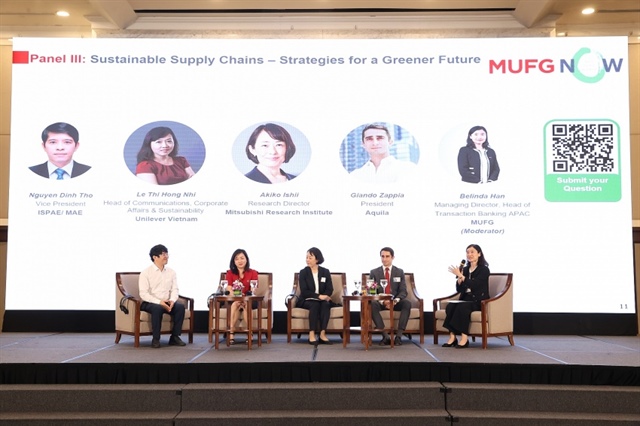
Speakers at the panel on smart and sustainable manufacturing |
The panel on sustainable supply chains ignited a vibrant discussion. Speakers from companies such as Unilever Vietnam, Mitsubishi Research Institute, and Aquila shared compelling insights into the vital role of sustainable supply chains, emphasising their commitments, the challenges they face, and the solutions required to drive this transformation. These organisations are proactively collaborating, forging connections, and supporting suppliers to collectively advance sustainability objectives.
"Consumers and investors are now holding manufacturers and businesses to ever-higher standards, while regulations on green production are growing increasingly stringent. Sustainability in supply chains encompasses environmental, social, and economic dimensions, all of which must align with net-zero objectives," said Akiko Ishii, research director, Mitsubishi Research Institute.
"Climate change is exerting profound effects, deeply impacting agriculture, industry, and Vietnam’s infrastructure. Companies must assess how these challenges affect their operations and implement precise strategies to minimise negative impacts while fostering robust, sustainable supply chains. This is an urgent and non-negotiable priority for business survival," added Ishii.
Requirements for sustainable financial packages
The Mitsubishi Research Institute highlighted that the primary challenge for most companies is financial, with insufficient funding to implement emission-reduction measures. Additionally, businesses struggle to raise product prices despite incurring extra costs for solutions to reduce greenhouse gas emissions, which are embedded in production expenses.
This poses a substantial hurdle for manufacturers. International corporations should, therefore, consider providing technical and financial support to their suppliers to facilitate participation in low-emission production.

Speakers at the panel on sustainable supply chains |
From a banking perspective, Mitsubishi Research Institute observed that opportunities abound for banks to offer products and services, such as sustainable financial solutions, which are vital for strengthening supply chain resilience.
In Vietnam, MUFG stands out as a bank supporting its partners through sustainable finance initiatives, with the bank deploying green financial products and solutions tailored for foreign enterprises in Vietnam earlier this year.
"We are steadfast in our commitment to supporting the nation’s decarbonisation efforts across key industries. Beyond hosting workshops, conferences, and ESG-focused exchange programs for clients, we have developed comprehensive sustainable finance solutions, including green loans, sustainability-linked products, and green trade finance offerings. These initiatives have been met with enthusiastic responses from our clients," said Kojima Masao, MUFG’s regional head of Vietnam.
MUFG Vietnam has also recently published its inaugural Sustainability Report, a voluntary initiative and a significant milestone in its operations and a source of immense pride.
"This report represents a major step forward in engaging stakeholders on climate issues. It details our ESG initiatives and outcomes, underscoring our commitment to fostering a brighter future. We hope this report proves valuable and inspires new ideas for your organisation," added Kojima.
- 17:46 28/04/2025


